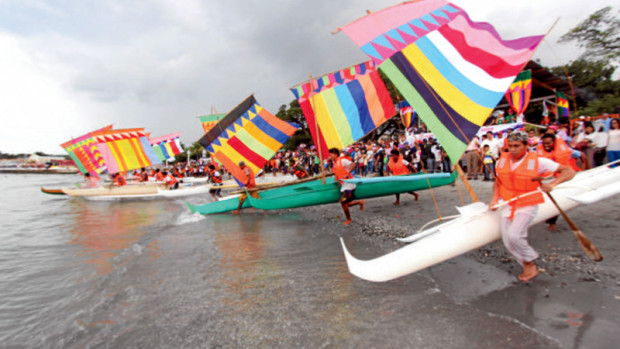DOT teaming up with DILG, DND to market Mindanao as peaceful tourist spot

File photo shows a regatta participant during the Zamboanga Hermosa Festival. (JULIE S. ALIPALA)
MANILA, Philippines — The Department of Tourism (DOT) signed an agreement with the Department of National Defense (DND) and the Department of the Interior and Local Government (DILG) to build up Mindanao as a peaceful tourist destination for both domestic and international travelers.
In a statement, the DOT said the memorandum of agreement was signed on May 31 in Zamboanga City to ensure peace, security, and order as the national government prioritizes tourism development programs in Mindanao.
During the ceremonial signing, each department committed to promoting tourism, preserving Mindanao’s diverse cultural heritage, and creating an inclusive environment to foster growth in the region further.
Tourism Secretary Christina Frasco, during the ceremony, stressed the DOT’s commitment to creating equal tourism opportunities, further stressing how it is high time for Mindanao to showcase the world its beauty.
Now, Mindanao
“It is time to put to the fore the ethereal Mindanao beauty that has sometimes been relegated to the backburner, to highlight to the world its spectacular views, its wonderful and amazing culture as well as the warmth and love of the people of Mindanao. Time has come to fully promote your sites, your heritage, your culture, your people, and to reintroduce this region to the world,” said Frasco.
Article continues after this advertisement“So, we signed this agreement today with high hopes and a firm resolve for us in the national government, to be able to deliver the necessary support from agencies of government to Mindanao so that you will receive the opportunities for tourism development that you deserve,” she added.
Article continues after this advertisementShe also bared the DOT’s plans to invite foreign ambassadors to witness the beauty of Mindanao.
Meanwhile, Secretary Carlito Galvez Jr. stressed the DND’s commitment to assist DOT in boosting Mindanao as a tourist spot.
“As we all know, Mindanao has a long history of being associated with violence, danger, and chaos. Terrorism has sought its ugly head and armed conflicts, not to mention the prevalence of crime, had sullied this promising area’s reputation, but that is no longer the case,” said Galvez.
“Through the National Tourism Development Plan 2023 to 2028, and pursuant to the guidance of President Ferdinand Marcos Jr., the DOT is set to establish Philippine tourism anchored on Filipino culture, heritage and identity, which aims to be sustainable, resilient and competitive in order to transform the Philippines into a tourism powerhouse in Asia,” he added.
Galvez said that the DND would continue to serve its mandate to protect the country, emphasizing the importance of tourists’ safety and the overall security of tourism across the country.
Tourist police and safe destinations
For his part, DILG Secretary Abalos emphasized the role of tourist police and local government units (LGUs) in making the region a safe destination.
“Through this convergence, the DILG commits to ensuring that our local police are properly deployed in tourist destinations,” said Abalos.
He also called on LGUs to engage civic and non-government organizations in formulating local tourism plans and tourism developmental projects.
3-pronged approach
The said memorandum sets a framework for developing rural and insurgency-free communities and areas with tourism potential in the region and other identified areas through implementing community-based tourism programs.
The DND, under the agreement, is tasked to sustain the current peace and security programs of the Armed Forces of the Philippines (AFP) by providing evaluation and recommendations in the prospective areas for tourism development.
The DILG, meanwhile, is tasked to sustain programs ensuring peace and order in tourist destinations by deploying tourism police personnel.
The DOT will be responsible for the development of tourism circuits, providing tourism product development to emerging destinations as well as the provision of training intervention programs and livelihood assistance to tourism communities and workers.